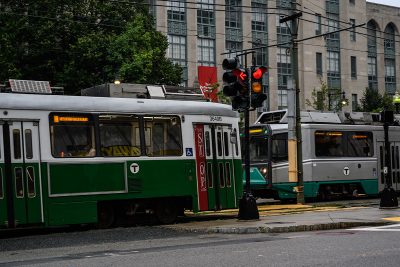Boston’s public transportation riders paying with cash or a CharlieTicket will no longer have to spend more than those with CharlieCards.

The Massachusetts Bay Transportation Authority lowered its cash and CharlieTicket fares Tuesday to match CharlieCard prices. Cash and CharlieTicket users will now pay $2.40 for rapid transit — down 50 cents from the previous fare.
With decreased ridership in the wake of a pandemic, the MBTA now faces an estimated $300-million budget deficit, according to an MBTA financial report.
Jarred Johnson, chief operating officer and development director at TransitMatters, an organization advocating for affordable transportation, wrote in an email that the fare changes are not related to the budget issues, but rather in response to claims that higher cash fares punish “unbanked” riders and riders with low incomes.
“The real issue isn’t costs, it’s that the T needs more revenue and needs to be less reliant on fares to be more resilient for future disasters or pandemics,” Johnson wrote. “It is often still difficult for bus riders to reload their card if there’s not a train station close by.”
Johnson wrote that the fare change should help lower-income riders, those without bank accounts and recent immigrants.
Marc Draisen, executive director of the Metropolitan Area Planning Council, said he hopes the budget issues are solved without laying off workers or raising fares.
“I’m hoping for two things. First, the federal government will do what it should do and provide additional revenue to transit during the pandemic,” Draisen said. “Secondly, if the state needs to raise additional taxes to make sure that the T survives and thrives, I think it should.”
The MBTA has increased fares several times in the past few years, Draisen said, but lower fares would help riders with financial challenges.
“It’s a recognition of the fact that a lot of their customers are in really difficult financial shape right now,” Draisen said. “They’ve come under a lot of criticism for really increasing fares, and I think they just felt it was time to give something back.”
In addition to budgetary changes, 23 bus routes that were not operating earlier in the pandemic resumed operations on Sunday, while other routes continue to have reduced ridership and scheduling.
Draisen said that because more than 1 million people use public transit in Boston, it is important to have a strong system in place. He said he hopes the federal government can work together to zone in on the country’s need for accessible transportation.
“My hope is that they will come to an agreement and when they do come to agreement, it will include additional funds for transit agencies,” Draisen said, “not only in Boston but throughout the state and throughout the country.”




